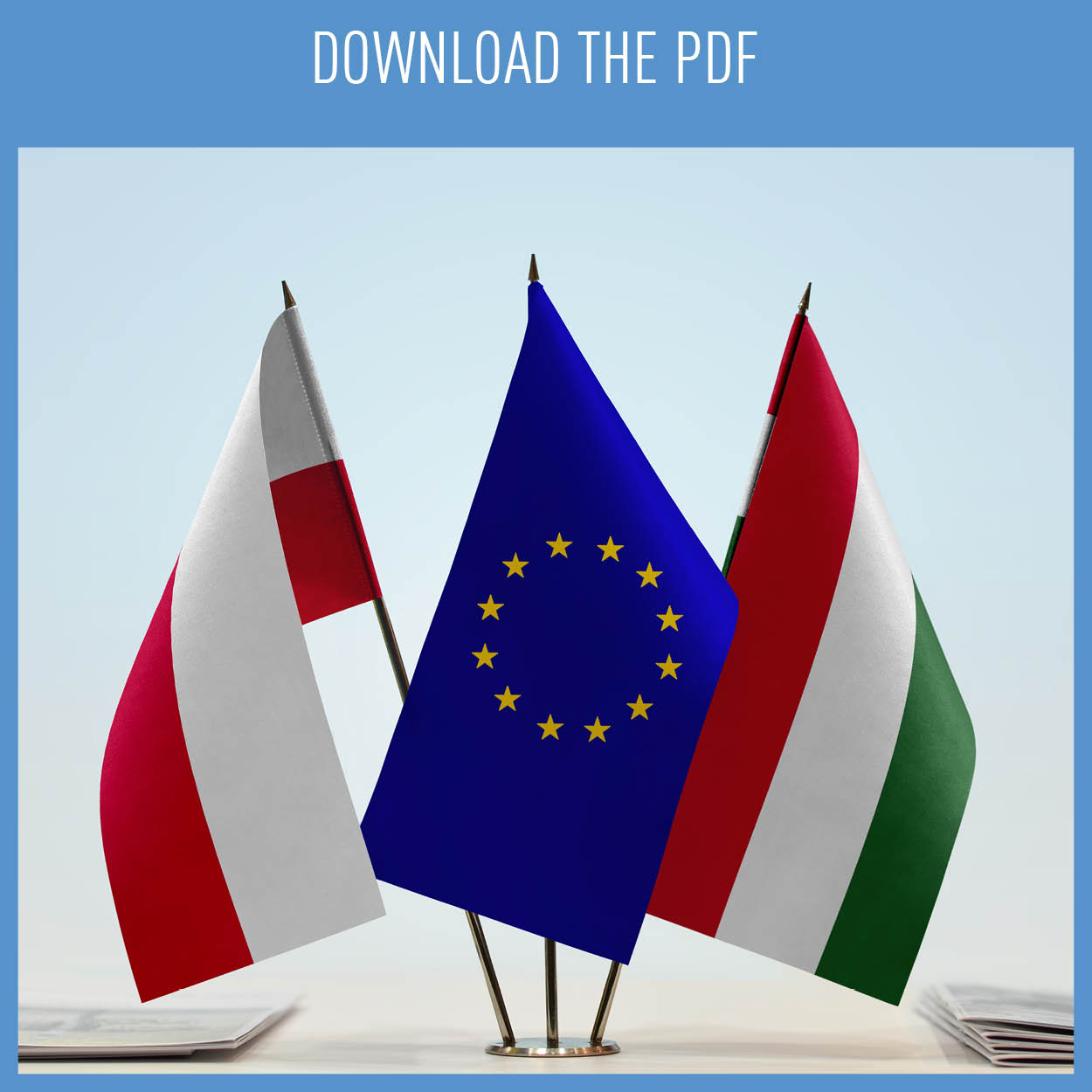Blog post
POWER STRUGGLE BETWEEN THE EUROPEAN PARLIAMENT AND THE COUNCIL ON THE EU BUDGET: WINNERS OR LOSERS?
BY CHRISTINE VERGER
Vice-President of the Jacques Delors Institute, rapporteur of the Jacques Delors Institute’s Political Observatory of the European Parliament.
On 16 November, Hungary and Poland vetoed the European budget and the recovery plan with a view to causing the failure of the compromise between the European Parliament and the EU Council which conditions the disbursement of European funding to Member States on their compliance with the rule of law. What follows is an explanation of this compromise which is both institutionally and politically important.
The historic agreement of 21 July
During the European Council meeting held on 21 July 2020, the 27 Heads of State and of Government reached a historic agreement after four days and nights of arduous discussions on the EU budget for the 2021-2027 period (€1074 billion) and on the European recovery package (€750 billion, of which €390 billion in grants, the rest in the form of loans). A pooling of States’ debt by the Commission to make transfers to Member States and to be reimbursed collectively was decided: a major first![1] The allocation of funding was made conditional on Member States’ compliance with the rule of law.
However, the drawback and the result of a compromise requiring unanimity from all States was that much funding was reduced from the Commission’s initial proposal, particularly regarding research, education, digital technology, health and defence policies. In addition, the procedure concerning compliance with the rule of law remained extremely ambiguous.
The ball in the European Parliament’s court
The ball was then in the European Parliament’s court. The annual expenditure ceiling in the EU budget is set in a long-term funding framework negotiated every seven years called the Multiannual Financial Framework (MFF). For the MFF, the Parliament enjoys assent powers that are equivalent to a right of veto. The European Council decides by unanimity.
Regarding the recovery package, the European Parliament is only informed but as the plan is backed by the MFF, the two are connected.
Parliament’s dilemma
The Parliament was then faced with a difficult dilemma. Firstly, the aim was to obtain improvements (an additional €39 billion) for three areas that are dear to it concerning fifteen flagship programmes concerning priority European policies for the future, the future of the EU’s own resources – with a view to reducing the share of national contributions to the budget – and the rule of law. Secondly, the implementation of the recovery package could not be endangered as it must generate quick concrete and expected effects on the daily lives of citizens and the economic and social situation of many countries following the health crisis.
A united Parliament, with a few slight variations
A vast majority of the Parliament’s political groups, represented by a six-member negotiation team[2], remained united during the entire duration of the negotiations. Yet slight variations emerged over time (very often not expressed in public), as reflected in the debates of the Jacques Delors Institute’s Political Observatory of the European Parliament[3] during its meeting held on 26 October 2020.
For some, the most important point was to maintain the date of 1st January for the recovery plan’s entry into force, and to focus the Parliament’s actions on priority issues that are understood by public opinion – in particular the health policy and the Erasmus programme – while adding the need to obtain more details on the future of own resources and preventing an excessively long institutional blockage.
However, the same people highlighted the worrying nature of the Council’s attitude, which actually consisted in renationalising some expenditure for some social and sovereign issues. For others, it was all too clear that behind the “miracle” of the July agreement all future policies had been trimmed and the Council had used the tactic of “take it or leave it” while favouring an inter-governmental dimension of the Union, already implemented over the last few years. For these people, the most important point was to resist, choosing the battles and attributing responsibility to Member States, even if that meant not maintaining the date of 1st January.
Another group put an excessively negative vision of the European Council’s results into perspective, stressing the relatively consistent pyramid regarding the Green Deal and an increased use of digital technology between national and European levels.
The offensive for compliance with the rule of law
Yet the other key offensive was launched by the Parliament on the conditionality of granting funds on compliance with the rule of law in recipient countries. A battle concerning values, and not only funding amounts. The Parliament could deem itself supported on this issue by public opinion, as a Eurobarometer survey of October 2020 stated that 77% of Europeans support the idea that the European Union should only distribute funds to Member States if national governments apply the rule of law and comply with democratic principles[4].
Some States, such as Austria and the Netherlands, siding with the European Parliament, made themselves champions of the rule of law, not without ulterior motives (as self-proclaimed “frugals”, they had accepted the July recovery package grudgingly). The Parliament threatened not to approve the EU budget if the Council did not make concessions concerning the rule of law. For the Parliament, it was essential, first and foremost, to establish an effective mechanism ensuring in particular that the final beneficiaries of funds would actually receive them.
Some MEPs proposed to transfer the management of European funds to the Commission, as is the case for the mechanism used for pre-accession.
In an opinion piece published in Le Monde on 6 October 2020[5], the Chairs of the four main political groups at the Parliament (EPP, S&D, Renew Europe and The Greens) wrote: “[O]ur values are not for sale. […] [W]hen a handful of people take control of public funds and public procurement, and corruption becomes par for the course. […] In order to tackle these urgent issues, it is crucial that we link respect for the rule of law to the disbursement of funds in the EU budget”.
The Jacques Delors Institute proposed on 14 October 2020 the specific terms of an agreement acceptable to all parties[6]. For researcher Eulalia Rubio, the Parliament must lower its ambitions regarding decision-making procedures, but must demand an extension of the instrument’s scope (types of breaches of the rule of law, clarity and precision of the conditions for triggering its use, etc.).
A compromise on the rule of law
The compromise found between the negotiators of the Parliament and the German presidency of the Council on 5 November follows along the lines of this proposal: in particular, the Council accepts to extend the instrument’s scope to cover not only proven irregularities in the use of European funds but any breaches which affect or may affect to a significant degree the management of funds or the EU’s financial interests (with examples of cases such as threatening the independence of the judiciary, failing to correct arbitrary/unlawful decisions and limiting legal remedies). The Parliament prevailed in part through the introduction of provisions designed to protect final beneficiaries. Contrary to what was requested by MEPs, the agreement does not allow the Commission to recover European funding from Member States and to redistribute it to final beneficiaries. Yet the agreement does enhance the obligations of States and the Commission to protect the latter (for example, the creation of a website so they can notify the Commission in the event of a breach of these obligations, etc.). Lastly, the Parliament succeeded in shortening the timeframe in which the Commission and the Council must adopt measures against a Member State (maximum 7-9 months instead of 12-13 months as initially requested by the EU-27). However, the Council prevailed regarding the decision-making procedure (with conventional qualified majority and not reverse majority voting as requested by the European Parliament).
The European Parliament’s main political groups were pleased with the agreement, welcoming it as both an important step towards an agreement on the MFF – hijacked by Member States hostile to the rule of law clause – and the first-time establishment of a mechanism that combines the disbursement of European funds and the rule of law.
There is still, of course, some way to go as the compromise must be adopted by Parliament during its session at the end of November and above all by the Council. Viktor Orbán already expressed his reticence on 9 November, as did his Polish counterpart. This hostility was confirmed during a meeting of EU-27 ambassadors on 16 November. Member States will also have to prove that this penalty mechanism can be put into proper application.
A compromise on the multiannual budget
A few days later, on 10 November, the Parliament’s negotiators and the German presidency came to an agreement on the amount of the multiannual budget. The agreement concerns an increase of €16 billion, primarily to be allocated to the following programmes:
- Horizon Europe (framework programme for research and innovation, + 4 billion),
- Erasmus (+ 2.2 billion),
- Health (+ 3.4 billion),
- InvestEU (a new feature of the MFF aimed at bringing all the financial instruments currently implemented to support investment in Europe together in a single structure (+ 1 billion).
Around €12.5 billion will be “fresh” money, mainly obtained through penalties related to the European competition policy.
In addition, a roadmap was decided regarding the introduction of new own resources: while the Council had already accepted the principle of a tax on unrecycled plastic waste, the Commission is tasked with submitting proposals within specific timeframes regarding a carbon border tax, a tax on the digital economy and a financial transaction tax in particular.
As regards the recovery package, the Parliament also won the power to control how amounts allocated from the recovery package are spent. In particular, it succeeded in adopting a procedure whereby the three institutions meet regularly to assess the implementation of funds and that the European Parliament, working with the Council, may check any discrepancies with previously agreed plans.
Lastly, the compromise provides that at least 30% of the total amount of the EU budget and the expenditure of the recovery package must support climate objectives.
This agreement, which does not modify the ceilings agreed during the European Council meeting in July 2020, paves the way for the implementation of the MFF as of January 2021. It also launches the ratification process in Member States for own resources and the recovery package. The Commission may only borrow from the markets when the decision on own resources has been ratified by the 39 Parliaments of the 27 Member States.
An initial assessment of these compromises
Great victories for the European Parliament
It was an uphill struggle for more than two months. Yet the European Parliament has certainly prevailed, both on the rule of law issue and on increasing the funding amounts for certain key future policies. On the latter point, €16 billion seems paltry compared to the €1074 billion that States were prepared to pay out, with the €12.5 billion of “fresh” money accounting for 1.16% of the total. Yet historically, the European Parliament had never yet obtained such increases, except for the 1989-1992 MFF. For the 2000-2006 and 2007-2013 MFFs, it obtained 0.21% and 0.23% respectively, and in the negotiations for the 2014-2020 MFF, it did not obtain any increases of the ceilings proposed by the European Council. Beyond the symbolic value of this, the policies concerned are essential for the post-Covid future and the budget is therefore rebalanced.
Secondly, the agreement introduces a new practice, that of using the revenues from penalties related to the competition policy to fund European programmes rather than transferring them to States via a reduction in national contributions to the EU budget. In the past, the Council has never granted this new practice to the European Parliament. If it becomes a principle in the years to come, it would be a great success, as penalties may bring in €1.5 to €2 billion per year.
By using these revenues, the additional amounts obtained do not affect the ceilings adopted by the Council in July 2020, which respects the delicate political balance achieved.
Many did not think this would be successful, particularly as the Parliament had very little time. During the session on 11 November, the representatives of all the political groups, with the exception of ID (Identity and Democracy – far-right), were pleased with the agreement, with some even calling it a “historic” move. This was certainly a compromise in which every party had to make concessions and which will no doubt disappoint some of the beneficiaries concerned, but given the very little room for manoeuvre they had, the result is visible and understandable for the public.
Underlying problems remain
Regardless of the remaining stages of the process, in particular the approval of the Council and of national parliaments, the operational nature of the rule of law agreement will depend on its actual implementation.
The same goes for the EU’s own resources – there is a long way left to go.
Many political and institutional issues also remain up in the air:
- The presence of political parties which do not respect the EU’s core values in the main European political groups and families.
- The weakness of the European Union’s budget in terms of the challenges the European continent faces (slightly more than 1% of Member States’ aggregated annual GDP), apart from the recovery package.
- The complex nature of the budget procedure, and the shortcomings of the democratic process, with a European Parliament particularly lacking power regarding the EU’s revenue. Does the recent budgetary debate illustrate a confirmation of the inter-governmental aspect of the EU, or an awakening of the only institution elected by direct universal suffrage?
- Should the EU’s competences be reviewed alongside its decision-making rules?
These are the main challenges reflected by the budget “power struggle” in recent weeks, that the future Conference on the Future of Europe, which is set to begin work soon, will face.
[1] Sébastien Maillard, “Un accord historique à améliorer et à réaliser“, Jacques Delors Institute, 27 July 2020 (in French).
[2] Johan Van Overtveldt (ECR, Chair of the Committee on Budgets), Jan Olbrycht (EPP, co-rapporteur MFF), Margarida Marques (S&D, co-rapporteur MFF), José Manuel Fernandes (EPP, co-rapporteur own resources), Valérie Hayer (Renew, co-rapporteur own resources) & Rasmus Andersen (The Greens/EFA).
[3] Made up of: Pascal Lamy (Chair), Christine Verger (rapporteur), Pervenche Berès, Jean-Louis Bourlanges, Monica Frassoni, Daniel Freund, Fabienne Keller, Alain Lamassoure, Javier Moreno Sánchez (members).
[4] “PUBLIC OPINION IN THE EU IN TIMES OF COVID-19 (3rd SURVEY), First Results”, European Parliament, October 2020.
[5] “Budget européen : une véritable conditionnalité liée au respect de l’Etat de droit est indispensable”, Le Monde, 6 October 2020 (in French).
[6] Eulalia Rubio, “Rule of law conditionality: what could an acceptable compromise look like?“, Jacques Delors Institute, 14 October 2020.
SUR LE MÊME THÈME
ON THE SAME THEME
PUBLICATIONS
Europe’s “rearmament” and the programmed obsolescence of its fiscal framework

For a Europeanisation of the sinews of war

Get ready: EU budgetary austerity is back

MÉDIAS
MEDIAS
Les travaux concrets du Parlement européen pour le prochain cadre financier pluriannuel débuteront en janvier 2025

La France peut-elle diminuer unilatéralement sa contribution à l’UE de 1 milliard d’euros, comme le demande Marine Le Pen ?


















